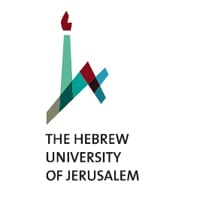Post-Doctoral Fellowship: Steppe Cities in Medieval Mongolia (History)
Position Details (Postdoc)
About our Campus:Nestled atop Mount Scopus in northeastern Jerusalem, the Hebrew University's Mount Scopus Campus offers breathtaking panoramic views of the city. Established in 1925 as the University's original campus, it remains a beacon of academic excellence. It houses the Faculties of Humanities, Social Sciences, Law, Business Administration, Education, and Social Work, as well as the Rothberg International School. With its rich history and dynamic academic community, the campus provides a distinctive setting that combines rigorous scholarship with the cultural and historical depth of Jerusalem.
About Our Department:TheDepartment of Asian Studies at the Hebrew University of Jerusalem is the oldest of its kind in Israel and one of the largest departments in the Faculty of Humanities, home to close to 300 students specializing in Chinese, Japanese, Korean, and India & Indonesia Studies. The department maintains an environment of close cooperation between students and faculty in a wide array of extracurricular activities and is characterized by a tradition of excellence in research and teaching.
About Our Research: This post-doctoral fellowship is part of an interdisciplinary effort to investigate the historical, archaeological and ecological contexts of cities in medieval Mongolia, notably the river valleys Orkhon, Selenga and Kerulen. Researchers utilize advanced methodologies, including remote sensing, Geographic Information System (GIS), artifact analysis, and historical text mining, to analyze data from multilingual literary sources, archaeological survey and excavations, soil samples and more.
Job Description: We are seeking highly motivated post-doctoral fellows to contribute to this Israel Science Foundation (ISF)-funded project on medieval cities in Mongolia. The successful candidates will specialize in history and engage in interdisciplinary research. The Post-Docs will analyze historical records to extract data on cities, nomadic tribes, agriculture, diplomacy, defense, taxation, trade policies, and climatic anomalies.
Fellows will be expected to conduct independent research, participate in field expeditions, attend project seminars, and contribute to academic publications.
About Your Supervisors:
Prof. Michal Biran is a historian of Inner Asia, imperial China, and the medieval Islamic world. She is the Max and Sophie Mydans Foundation Professor in the Humanities at the Hebrew University of Jerusalem, where she currently heads the Institute of Asian and African Studies. She is also a member of the Israel Academy of Science and Humanities and a Distinguished Professor of History at Ewha Womans University in Seoul.
Biran has published extensively on the Mongol Empire, Mongol and pre-Mongol Central Asia, cross-cultural interactions between China, nomadic empires, and the Muslim world, as well as on migration, mobility, and Ilkhanid Baghdad. A recipient of multiple Israeli and international awards, she is the author or editor of 16 books and volumes and dozens of scholarly articles. Her most recent work includes co-editing The Cambridge History of the Mongol Empire (2 vols., 2023).
Prof. Gideon Shelach-Laviis the Louis Freiberg Professor of East Asian Studies at the Hebrew University of Jerusalem. An archaeologist specializing in China and Mongolia, he has authored ten books and more than 70 papers in leading international journals. His research explores the transition from hunter-gatherer to agricultural societies, the rise of complex societies, and human responses to climatic and ecological change.
In recognition of his outstanding academic and professional achievements in archaeology, he was awarded the EMET Prize in 2022.
Funding:
Monthly stipend of 2550 $
Your Profile (To excel in this role, we seek candidates with):
- Proven academic excellence:
- Comprehensive knowledge of Inner Asian and Chinese history.
- Sound knowledge of Classical Chinese and demonstrated experience working with Chinese sources from the Tang, Liao, Song, or Yuan periods.
- Fluency in additional languages (such as Mongolian, Russian, or Classical Uighur) – an advantage.
- Specialization in the late Tang (Uighur) period - an advantage.
- Proficiency in Digital Humanities tools - an advantage.
Embracing Diversity:At Hebrew University we believe that diversity inspires creativity, fosters curiosity, and enriches our ecosystem through academic collaboration and cultural exchange. We consider every member of our community an integral part, irrespective of their religion, gender, or ethnic origin.
The University is home to nearly 25,000 students across our 6 campuses, including ~2,500 international studentsper year representing 90+ countries. You’ll enjoy the opportunity to engage with your peers here on equal ground, in an environment that promotes equity and inclusion, and celebrates the contribution of its talented members.
Application: Please submit the following documents
- Letter of motivation
- CV (including a list of publications)
- Copy of your original academic degree(s)
Writing sample
In addition, two letters of recommendations will be sent directly to[emailprotected]; [emailprotected]
Application Deadline: See details below.
Deadline: January 17, 2026.
The position may begin as early as February 2026, or at a later date – no later than October 2026. An earlier start is preferred.
About Hebrew University:TheHebrew University of Jerusalem(HUJI) is one of the world's leading research institutions, consistently ranked as a global top 100 university. Established by luminaries such as Albert Einstein, the University is at the forefront of groundbreaking research, entrepreneurship, and innovation across various domains, including brain sciences, medicine, biomedicine, life sciences, mathematics, agriculture, and more. Our 6 campuses house 100+ research centers, with ~4,000 research projects underway year-round.
About Jerusalem:Hebrew University is an integral part of Jerusalem, Israel’s capital and one of the most fascinating, diverse cities on earth. Thousands of students from across the globe live in Jerusalem, immersing themselves in its vibrant cultural and culinary scenes, while marveling at the juxtaposition of its 3,000-year-old history and cutting-edge modernity. Students make the most of their spare time by enjoying Jerusalem’s myriad attractions, from restaurants, cafes and pubs, to dance clubs, museums, theaters, and year-round festivals.



 Hebrew University of Jerusalem
Hebrew University of Jerusalem